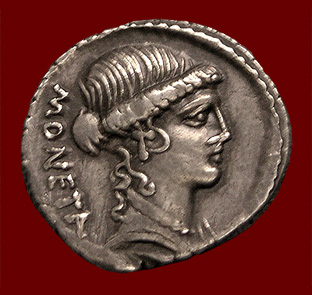With a tip of the biretta to rogue classicism o{]:¬) I share now that in ancient history today, called by the Romans and still by the Catholic Church ante diem vi idus octobres …
 .
... there were enacted the rites in honor of Juno Moneta. These rites commemorated the restoration of the temple of Juno Moneta on the eastern part of the Capitoline Hill. The temple was vowed by M. Furius Camillus in 345 B.C. The goddess Juno has the title "Moneta" here because when the Gauls invaded Rome and the people were forced to take refuge on the Capitoline, and when the Gauls tried to scale the flank of the hill, they wound up in the pen of Juno’s sacred geese. The geese were none too pleased at these night visitors and began honking loudly, thus alerting the Romans to the attack. Thus, the Romans were "warned" by Juno. The Latin for "warn" is moneo. But that’s not all. Since the Temple of Juno Moneta was used as a mint for coins, this is how we get the world "money" in English. In Italian a coin is still a "moneta". The ruins of the temple are right behind the beautiful Ara Coeli basilica.
Today is also the anniversary of the death of Germanicus in A.D. 19, the adopted son of Tiberius. There is a fanciful account of his death in Robert Graves’ I, Claudius which in both book form and in the stunning made-for-TV series is quite engaging. There is also a famous painting of the "Death of Germanicus" by Poussin in the Minneapolis Art Institute. A friend of mine in Rome, a great art expert and collector, also had Poussin’s "Death of Germanicus" in his studio. To tell the truth, he had visited Minneapolis to look at the version there and he was unable to determine if his was the final copy of Poussin’s great work and the one in Minneapolis was the study, or the other way around.
Flip a moneta.


































Interesting seeing the Roman coin photo. I have a reproduction of a Roman coin that came in a bag of cookies.
Obviously, at one time I had a lot of these coins.
Hmmm….so money by it’s very name is a warning?
Since Spanish has its roots in latin, the word for
coin is “moneda”. However, the translation of
money is “dinero”, from the latin denarius (according
to wikipedia).
I’m not an expert in languages, so this is enough
for me to scratch my head.
Derik
Hmmm….so money by it’s very name is a warning?
Comment by RosieC
The Romans established a mint in the temple of Juno Moneta
http://www.thaliatook.com/OGOD/moneta.html
Apparently society worshipped money even back then.
Apparently society worshipped money even back then.
Comment by Other Paul
No, the Romans thought that Juno was responsible for the warning (NB: monere–to warn; cf. adMONition) that saved them from the Gauls.
Follow the link. That’s why I posted it.
However, the translation of
money is “dinero”, from the latin denarius (according
to wikipedia).
The word ‘denarii’ is actually Roman coin used in New Testament times.
Father, also “pecunia” (see the English term ‘pecuniary’) has an interesting origin…that has to do with …animals.
The Online Etymology Dictionary says:
pecuniary
1502, from L. pecuniarius “pertaining to money,” from pecunia “money, property, wealth,” from pecu “cattle, flock,” from PIE base *peku- (cf. Skt. pasu- “cattle,” Goth. faihu “money, fortune,” O.E. feoh “cattle, money”). Livestock was the measure of wealth in the ancient world. For a related sense development in O.E., see fee. Cf. also Welsh tlws “jewel,” cognate with Ir. tlus “cattle,” connected via notion of “valuable thing.”
http://www.etymonline.com/index.php?term=pecuniary
Moneta is mint.
Denarius is what we call a “denomination” – it is like a 10 dollar bill.
You can have “denarii duo una moneta impressi” – that is two “denarii” coined as one mint.
Pecunia is gold or silver money, whereas the word for “money” as a generic name is “nummus”.
The word pecunia comes from cattle – the earliest tradable possession. The word “peculiar” comes from the same root: it’s kind of like saying: “something resembling YOUR cattle”.
Next time someone tells me ‘give your money’
I will answer “you have been warned” :-)
Derik
Derik: Next time someone tells me ‘give your money’ I will answer “you have been warned” :-)
Please check out the donation button on the left side bar!
o{],¬)
In Polish too, a coin is called “moneta”. “Money” equivalent however is “pieni?dz”, which seems to be a very old loan word from Germanic (some etymologists say that that Germanic word gave us also German “pfennig” and English “penny”).